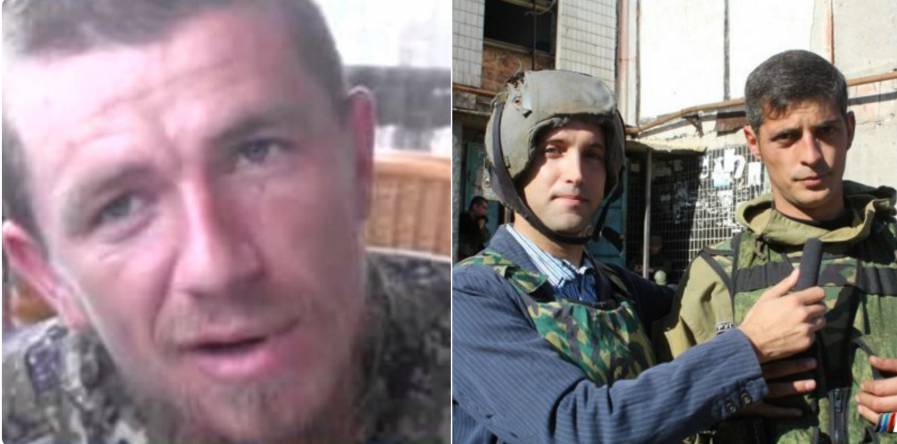Kremlin-backed Donbas militants accuse Ukraine and USA of ‘terrorist’ killings

The self-proclaimed ‘Donetsk people’s republic’ [DPR] and Russian media have widely reported militant claims that the head of Ukraine’s counter-intelligence service was behind the killing of two prominent militants, with US involvement also stressed. No evidence is provided nor any explanation as to why Ukraine would kill two militants whom it wanted to try for war crimes. It is also unclear whether the USA is viewed as a knowing or unsuspecting accomplice to the ‘crime’.
The DPR’s so-called ‘ministry of state security’ has asserted that Oleksiy Petrov, head of the Ukrainian SBU counter-intelligence department ‘commissioned’ the killings of Russian mercenary Arseny Pavlov [‘Motorola’] and Ukrainian militant Mykhailo Tolstykh [Givi]. The claim, uncritically repeated by the Russian state-controlled Rossiya-24, is that Petrov’s department has “special units which carry out terrorist war against Donbas, and which are created with financial support from the USA”.
Rossiya-24 quotes a DPR spokesperson Maria Petrova as saying that soon after Givi was killed, Ukraine’s President Petro Poroshenko appointed Oleksiy Petrov head of the counter-intelligence department “for his services before the Ukrainian authorities which are effectively crimes against the republic”. This supposedly means that Poroshenko personally authorized the killings of Motorola and Givi.
The spokesperson claims that Petrov “is continuing to coordinate the planning and implementation of actions against the population of Donbas”, and that his post “enables him to directly agree these with the head of the SBU and with US representatives.”
There have been fears since the first videoed ‘confessions’ of two captured Ukrainian intelligence officers – Serhiy Ivanchuk and Ivan Deyev – that the militants or Moscow may be planning to use them to try to present Ukraine as a ‘state terrorist’.
The first reports and ‘videoed confessions’ were posted on March 10, a day after preliminary hearings ended at the UN’s International Court of Justice into Ukraine’s charges against Russia of financing terrorism. The timing was clearly deliberate since the men had been captured a month earlier, on Feb 11.
As well as ‘confessing’ to the killings of militants, the men were supposed to have been planning multiple terrorist attacks against civilians in the Luhansk oblast, in cities of Crimea and the Russian Federation.
Although the original videos were posted by the so-called ‘Luhansk people’s republic’ [LPR] and one of the captured men mentioned different names, it seems likely that the new DPR reports are linked to their capture.
Psychologist Oleh Lokalchuk sounded the alarm soon after the videos were publicized. He noted the way Ivanchuk seemed unable to sit straight and said that this could be because of neuroleptic drugs. In general, the attempt to produce supposed ‘interrogations’ had failed, he added, with everything about the men’s condition and behaviour suggesting that illegal forms of interrogation had been applied to obtain such ‘confessions’. Ivanchuk also shows signs of having been beaten, while Deyev appears dazed,
Ivanchuk ‘admits’ responsibility for the car bomb that killed militant ‘police’ head, Oleh Anashchenko on Feb 4, and for involvement in what is claimed to have been the SBU-organized killing of Givi.
Other versions soon appeared, with militant sources reporting plans to kill the head of the so-called Donetsk people’s republic Alexander Zakharchenko.
Deyev ‘confirms’ having heard that a Ukrainian military intelligence major had boasted of killing ‘Motorola’.
The foreign link was clearly pushed from the outside. Deyev, for example, talks of having received training in subversive activities by NATO instructors from Latvia and Lithuania. This provoked a long report on pro-militant / pro-Russian sites, claiming a ‘Baltic lead’.
The new focus on American involvement is not so very new at all, but had mellowed for a while, with the militants following Moscow in obviously supporting Donald Trump during the US elections and after his victory. Now all reports not only point to the SBU as allegedly organizing the killings, but keep mentioning the USA’s supposed role.
Tolstykh, or Givi, was killed on Feb 8, 2017, in the very centre of Donetsk. Pavlov or ‘Motorola’ died in a bomb explosion in his seriously well-guarded apartment building in Donetsk on October 16, 2016. He was suspected of killing Ukrainian Donetsk Airport defender Ihor Branovytsky in cold blood and had himself boasted of having shot 15 prisoners of war. The same eye-witnesses to Motorola’s murder of Branovytsky have reported that Givi, together with two Chechens and a woman, took part in torturing Branovytsky and the other prisoners.
This is only one of very many cases where witnesses could have testified to clear war crimes committed by both Givi and Motorola. Militant and Russian media present both militants as ’heroes’.
Even had the two militants not been heavily guarded and difficult for SBU officers, trying to act unnoticed, to kill, there was simply no reason for them to do so. Ukraine needed them alive and on trial for their war crimes and for vital testimony about Russia’s undeclared war against Ukraine.





